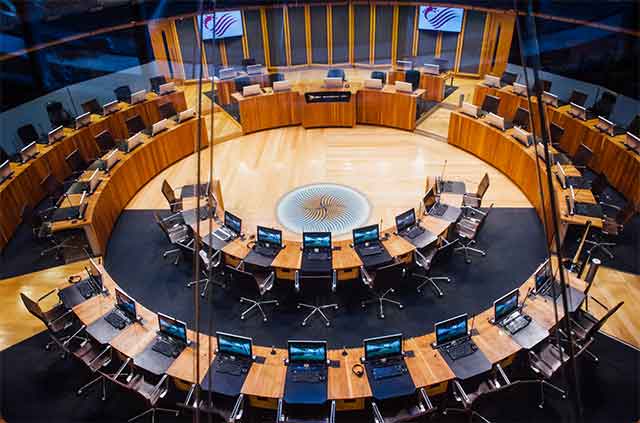Senedd members called on the UK Government to “get its house in order” before ploughing ahead with plans to slash welfare spending by nearly £5bn.
The Senedd’s equality committee urged Liz Kendall, the UK work and pensions secretary, to address barriers disabled people face in accessing employment before reforming welfare.
Ms Kendall announced the biggest shake-up to the welfare system in a generation in March, including plans to tighten up the eligibility criteria for personal independence payment (Pip).
In a letter to UK ministers, Jenny Rathbone, the Labour chair of the equality committee, wrote: “We have been contacted by individuals and stakeholders expressing deep concern about the proposed changes and the impact they will have on local economies.
“We share these concerns and feel strongly that the Department for Work and Pensions (DWP) – alongside employers and other tiers of government – must work much harder to get their houses in order before implementing reform.”
‘Barriers’
Ms Rathbone added: “We urge the [UK] Government to acknowledge these concerns and keep the people affected at the heart of its decision-making.”
In March, her committee concluded an inquiry into the disability employment gap, warning that too many people face physical and institutional barriers to the world of work.
The gap, which is the difference of employment rates between disabled and non-disabled people, stood at 30% in 2023/24 and has consistently been higher than elsewhere in Britain.
Ms Rathbone wrote: “We felt it was important to urge the UK Government to address the specific barriers disabled people face in accessing employment – identified in our report – before changes to eligibility and support for disabled people are implemented.”
She called for urgent action to radically improve support for disabled people to gain and retain employment before removing entitlements.
‘Raising the anchor’
The committee criticised the DWP’s “poor performance”, with delays of up to 20 weeks in accessing support through the Access to Work scheme.
As many as 275,000 people in Wales receive Pip and 110,000 who receive universal credit have limited capability for work-related activity, according to the Bevan Foundation.
Senedd members on the equality committee wrote: “The UK Government intends to introduce these changes at speed with changes to Pip and universal credit scheduled for August and November 2026 respectively.
“We do not support this timetable until progress is made to tackle barriers which contribute to the disability employment gap, with evidence that comprehensive support is in place.
“Such an approach risks raising the anchor before checking the sails and we urge the UK Government to look again at the timing and sequencing of these changes.”
‘Principled reasons’
The committee’s letter acknowledged the case for reform, with a 45% increase in the number of people claiming health-related benefits since 2018/19.
“We agree that action is needed in instances where there is evidence of perverse incentives in the current system,” wrote members of the committee.
“However, while the impact of other factors such as NHS waiting times is acknowledged, there is a risk current proposals fail to capture the complexity behind why the number of people claiming continues to grow.
“Some of the changes, as highlighted by the Resolution Foundation, appear to be primarily designed to save money and to help meet fiscal rules rather than for principled reasons.”
Senedd members added: “Given the potential impact on Welsh individuals and communities, we call on the UK Government to ensure that spending on disability benefits is determined by the level of need and not by a desire to meet fiscal targets.”
‘£470m hit’
Impact assessments published by the UK Government – which were carried out on an England-and-Wales basis – were inadequate and lacked detail, according to the letter.
Warning cuts will have a disproportionate impact on Wales, the letter stated: “While the UK Government is yet to publish an impact assessment for Wales, analysis from stakeholders starkly illustrates the potential impacts of the proposed reforms….
“Policy in Practice suggests that they will hit Wales and north-east England the hardest. It estimates that nearly 190,000 people in Wales will be affected by the reforms, with a potential financial impact of £470m.
“According to their analysis, four of the 10 worst-affected local authorities in Great Britain are in Wales: Blaenau Gwent, Merthyr Tydfil, Neath Port Talbot and Caerphilly.”
Senedd members stressed: “Given these findings, it is critical that the UK Government gives clarity on how it anticipates Wales will be impacted.”
Child poverty
The equality committee’s letter also expressed concerns about the potential impact on children, young people and poverty rates in Wales.
Criticising proposals to end health-related universal credit payments for under-22s altogether, the letter said: “Our concerns about these changes in relation to children and to levels of child poverty are particularly acute.
“Children have no control over their circumstances and lack any means of redress. More children and young people live in poverty in the UK than any other age group.
“We recognise the need to reduce youth unemployment and economic inactivity, and its potential scaring effects. We want to see all children and young people fulfil their potential.
“However, we are concerned that these aims are undermined if rates of child poverty continue to increase as has been suggested as a result of these policy changes.”

